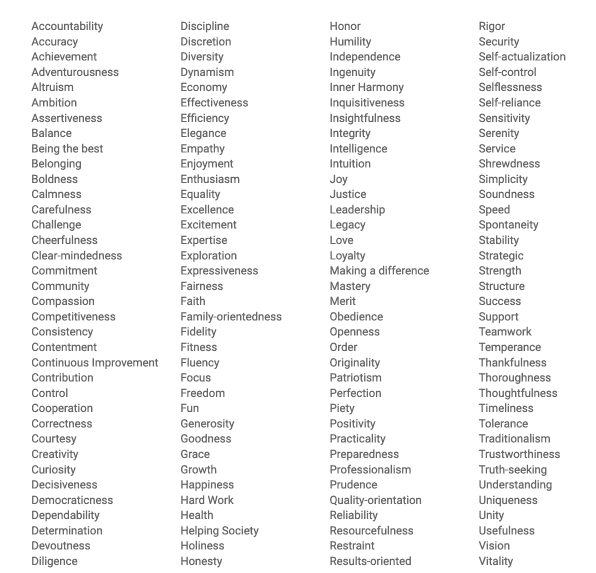As a way to help myself grow in my first year as a manager, I’ve been working through Google’s New Manager Training which they have generously published online. One exercise that stood out to me was a “values selection” process, where they encourage managers to select a ranked list of 5–10 words that resonate with them as values from a list of around 400 “values words”.

Choosing values is an odd process, because you’re choosing between “goods”. When I first went through this sheet, I circled over 40 words as values that “resonated” with me. They’re things that I value and strive for, or wish that I was more like. Deciding between adventurousness and cowardice is not a “values decision”. A real values decision means that you’re trying to decide whether good traits like adventurousness, belonging, or clear-mindedness are more important to you.
Management often forces you to choose between goods: Will we ship quicker? Aim for higher quality? How do those choices impact work/life balance for our teams?. It’s hard to know if we’re making good choices, because the results routinely lack clarity. Indicators lag, causation is fuzzy, and we don’t get to compare to a control group. Values can be guideposts through ambiguity. I’ve seen the power of this at a company level in my current gig, where having a set of values that are kept in the spotlight often allows us to weaponize them as decision making tools [1].
Going through the list, I eventually cut things down to 20, 12, 10 and then 8. That still feels like a lot to me, but for each of the 8 I can easily cite work situations I’ve faced in the past month where my response came directly out that value. In the end I ended up with Integrity, Thankfulness, Community, Prudence (in the classical sense), Generosity, Continual Improvement, Accountability, Justice. I find that these are easy to connect to my everyday work when I write them out as more detailed sentences though.
- Act with integrity.
- Live with thankfulness for what I’ve been blessed with.
- I want to work and live life in community.
- Make decisions based on a rational analysis of reality, not feelings and first impressions (Prudence).
- Don’t save it all for myself. Leave margin and be generous.
- Continual Improvement + Goodism are a powerful combo[2].
- Be accountable for my responsibilities and hold others to the same.
- Actively work for justice
I’ve published them here with a bit more detail.
Those are “guideposts” that I can easily quote to myself or post up somewhere, but they still have enough substance to say something meaningful when I’m considering how to handle a low-performing employee, organizational changes, or personal career decisions. I’ve already seen these values bring a clarity to my thinking about tough things in a short period of time. If you’re interested, I highly recommend checking out Google’s training.
-
I’ve also seen how quickly this becomes useless when those values are not universally embraced or enforced. ↩
-
Probably a separate post, but goodism has always been my response when asked if I’m a perfectionist: “I’m a goodist. I care about doing work that is good and meets the needed standards, but tend to move to the next challenge when I pass that bar and hit diminishing returns”. ↩